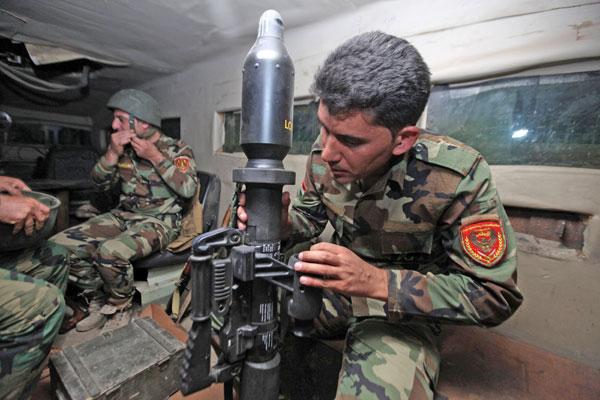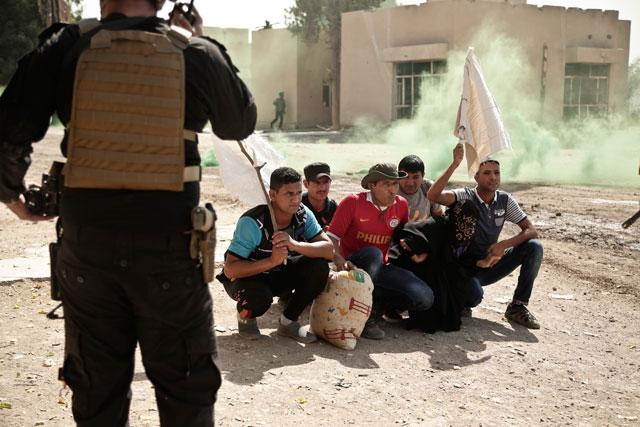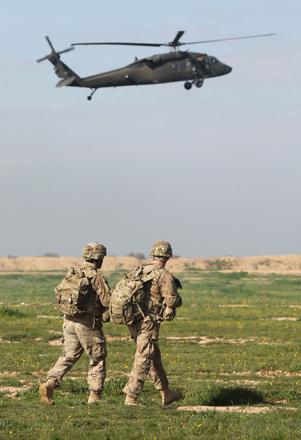You are here
Kurdish forces open new front on Daesh stronghold in Mosul
By Reuters - Aug 15,2016 - Last updated at Aug 15,2016

A member of the Kurdish peshmerga forces checks his weapon in a military vehicle on the southeast of Mosul, Iraq, on Sunday (Reuters photo)
BAGHDAD — Kurdish peshmerga forces on Monday said they had secured a river crossing point enabling them to open a new front against the Daesh terror group and further tighten their grip on the militant-held Mosul.
Backed by air strikes from the US-led coalition, Kurdish fighters reached Kanhash, the western side of the Gwer Bridge, the target of an offensive that started on Sunday.
The militants damaged the bridge, across the Grand Zab River and to the southeast of Mosul, two years ago as they swept through northern and western Iraq. Repairing the bridge would allow peshmerga and other anti-Daesh forces to move towards Mosul from a new front.
“Control over Kanhash Heights give the peshmerga strategic advantage over nearby enemy positions and the main road linking Mosul,” tweeted Masrour Barzani, the head of the Kurdistan Region Security Council.
“This successful operation will tighten the grip around ISIL’s [Daesh’s] stronghold Mosul,” he added.
About 150 square kilometres were taken from the militants along the Grand Zab which flows into the Tigris, Kurdish officials said.
The Iraqi army and the peshmerga forces of the Kurdish self-rule region are gradually taking up positions around Mosul, 400km north of the capital Baghdad.
It was from Mosul’s Grand Mosque in 2014 that Daesh leader Abu Bakr Al Baghdadi declared a “caliphate” spanning regions of Iraq and Syria.
With a pre-war population of nearly 2 million, it is the largest urban centre under the militants’ control and its fall would mark the effective defeat of Daesh in Iraq, according to Prime Minister Haider Al Abadi, who has said he aims to retake it this year.
The Iraqi army is trying to close in from the south. In July it captured the Qayyara Airfield, 60km south of Mosul, which is to serve as the main staging post for the anticipated offensive.
“Noose tightening around #ISIL terrorists: #peshmerga advancing east of #Mosul, #ISF shoring up south near #Qayyara,” tweeted Brett McGurk, the US envoy to the coalition fighting the extremist group in a comment on the Kurdish offensive.
The militants were using suicide car bombs and mortar rounds to try to slow the Kurds’ advance, said Saif Hameed, a Reuters correspondent who covered the offensive on Sunday.
“At the sixth village we entered, we received the usual incoming fire and the gunner was firing back... mortars started to land on our right every three minutes,” said Hameed, who was moving in a peshmerga armoured truck with a group of journalists.
“Suddenly one of the men who was anxiously watching through the narrow, shattered bulletproof glass shouted and all eyes turned to the left,” Hameed said. “It was a car bomb and it was speeding towards us.”
“The gunner opened fire from the turret and it vanished. We didn’t know where it went. As we retreated from the village, we were told it exploded elsewhere.”
Daesh said in a statement on its Amaq news service that two car bombs driven by suicide fighters were detonated in one of the villages to block advancing Kurdish forces, causing casualties among the peshmerga.
Authorities in autonomous Kurdistan gave no toll for the fighting, other than confirming on Sunday the death of a Kurdish TV cameraman and the injury of another journalist.
Preparations for the offensive on Mosul were nearing the final phase, McGurk told reporters during a visit to Baghdad on Thursday. He said the planning included considerations for humanitarian aid to uprooted civilians.
Up to 1 million people could be driven from their homes in northern Iraq, once fighting intensifieds around Mosul, posing “a massive humanitarian problem”, the International Committee of the Red Cross forecast last month.
More than 3.4 million people have already been forced by conflict to leave their homes across Iraq, taking refuge in areas under control of the government or in the Kurdish region.
Related Articles
WARDAK, Iraq — Kurdish peshmerga forces launched a fresh attack on Daesh militants early on Sunday as part of a campaign to capture Mosul, t
BAGHDAD — Iraqi forces battling to retake Mosul have cut the last road out of the city, trapping the Daesh terror group militants inside, th
ALBUQUERQUE, United States — The United States is sending about 600 extra troops to Iraq to train local forces for an upcoming offensive on
















